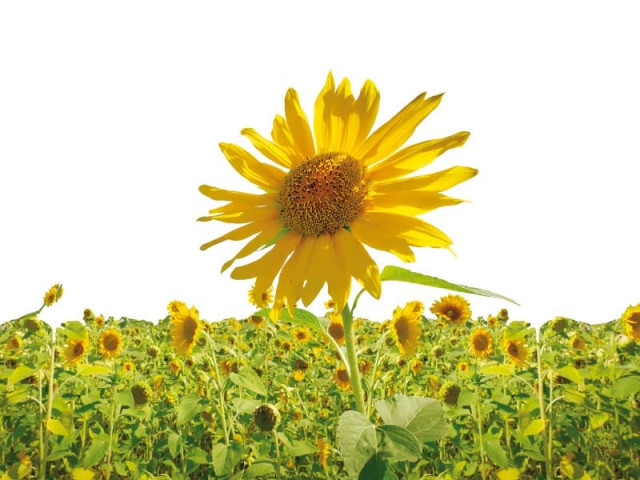Govt devises plan to promote sunflower crop
Step being taken to increase edible oil production to lessen import bills

Under the programme, sunflower crop would be cultivated on more than 0.2 million acres of land in different areas of the province.
Officials in agriculture department said on Tuesday that the step was being taken to produce maximum edible oil in order to lessen the import bills. They added currently, only 34% edible oil was being produced within the country while 66% was being imported for domestic needs for which the government was spending huge foreign exchange.
The demand of edible oil had increased rapidly and sunflower crop could play a vital role as its seeds contain 40% oil capacity as compared to other oil seed crops, said an expert.
Farmers to get subsidy
Sunflower would be cultivated on 6,000 acres in Sialkot Tehsil, Daska, Pasrur and Sambrial Tehsil, he maintained.
Meanwhile, strict monitoring had been started for ensuring 100% wheat cultivation targets on 1,650,000 acre of land in Sargodha Division.
This was said by Agriculture Director Muhammad Ramzan in Sargodha. He said directions had been issued to deputy directors, assistant directors and field assistants to complete their target as soon as possible as the wheat cultivation season will last till end of December.
He disclosed that monitoring teams had already been formulated which were visiting the whole division to ensure 100% wheat cultivation target.
The agriculture director maintained the provincial government had provided 7,072 free wheat seed bags in the division, including 2,284 bags in Sargodha, 1,043 in Khushab, 1,866 in Bhakkar and 1,879 in Mianwali.
Mound Dillu Roy’s excavation commences
Similarly over 508,000 acre of wheat was being cultivated in 805 villages of Sargodha District, 232,000 acres wheat at 200 villages of Khushab, 415,000 acre wheat at 509 villages of Bhakkar, while 418,000 acre wheat will be cultivated at 227 villages of Mianwali District, he pointed out.
Earlier, agriculture experts said that sowing wheat early in standing crop saves time, resources and delivers best production results. They, however, advised farmers to free the field from weeds. The experts maintained that healthy and disease-free seeds of wheat should be chosen, while the seeds should be treated with anti-fungus agent before sowing.
They added after sowing, farmers should keep the beds wet or moist for better germination. They elaborated that in time sowing enhances wheat production by 50%. It also reduces land preparation expenses by 95% and hence become a profitable practice.
Published in The Express Tribune, December 6th, 2017.



















COMMENTS
Comments are moderated and generally will be posted if they are on-topic and not abusive.
For more information, please see our Comments FAQ